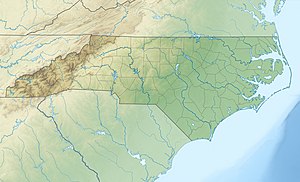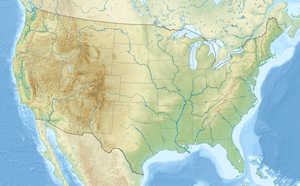Gold Branch is a 3.19 mi (5.13 km) long 2nd order tributary to Richardson Creek in Union County, North Carolina.
| Gold Branch Tributary to Richardson Creek | |
|---|---|
| Location | |
| Country | United States |
| State | North Carolina |
| County | Union |
| Physical characteristics | |
| Source | Crisco Branch divide |
| • location | pond about 1.5 miles southwest of New Salem, North Carolina |
| • coordinates | 35°07′36″N 080°24′08″W / 35.12667°N 80.40222°W[1] |
| • elevation | 560 ft (170 m)[2] |
| Mouth | Richardson Creek |
• location | north end of Polk Mountain |
• coordinates | 35°05′40″N 080°23′13″W / 35.09444°N 80.38694°W[1] |
• elevation | 385 ft (117 m)[2] |
| Length | 3.19 mi (5.13 km)[3] |
| Basin size | 4.66 square miles (12.1 km2)[4] |
| Discharge | |
| • location | Richardson Creek |
| • average | 5.70 cu ft/s (0.161 m3/s) at mouth with Richardson Creek[4] |
| Basin features | |
| Progression | Richardson Creek → Rocky River → Pee Dee River → Winyah Bay → Atlantic Ocean |
| River system | Pee Dee |
| Tributaries | |
| • left | unnamed tributaries |
| • right | Brandon Branch |
| Bridges | Little Staton Road, New Salem Road, New Hope Church Road |
Course
editGold Branch rises in a pond about 1.5 miles southwest of New Salem, North Carolina and then flows south to join Richardson Creek at the north end of Polk Mountain.[2]
Watershed
editGold Branch drains 4.66 square miles (12.1 km2) of area, receives about 48.0 in/year of precipitation, has a wetness index of 420.59, and is about 36% forested.[4]
References
edit- ^ a b "GNIS Detail - Gold Branch". geonames.usgs.gov. Locality, LLC. Retrieved 8 October 2020.
- ^ a b c "Gourdvine Creek Topo Map in Union". TopoZone. Locality, LLC. Retrieved 8 October 2020.
- ^ "ArcGIS Web Application". epa.maps.arcgis.com. US EPA. Retrieved 8 October 2020.
- ^ a b c "Gold Branch Watershed Report". US EPA Geoviewer. US EPA. Retrieved 8 October 2020.

